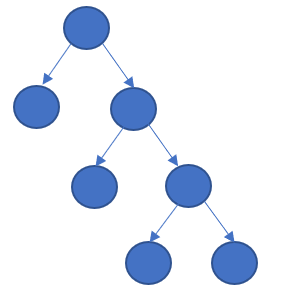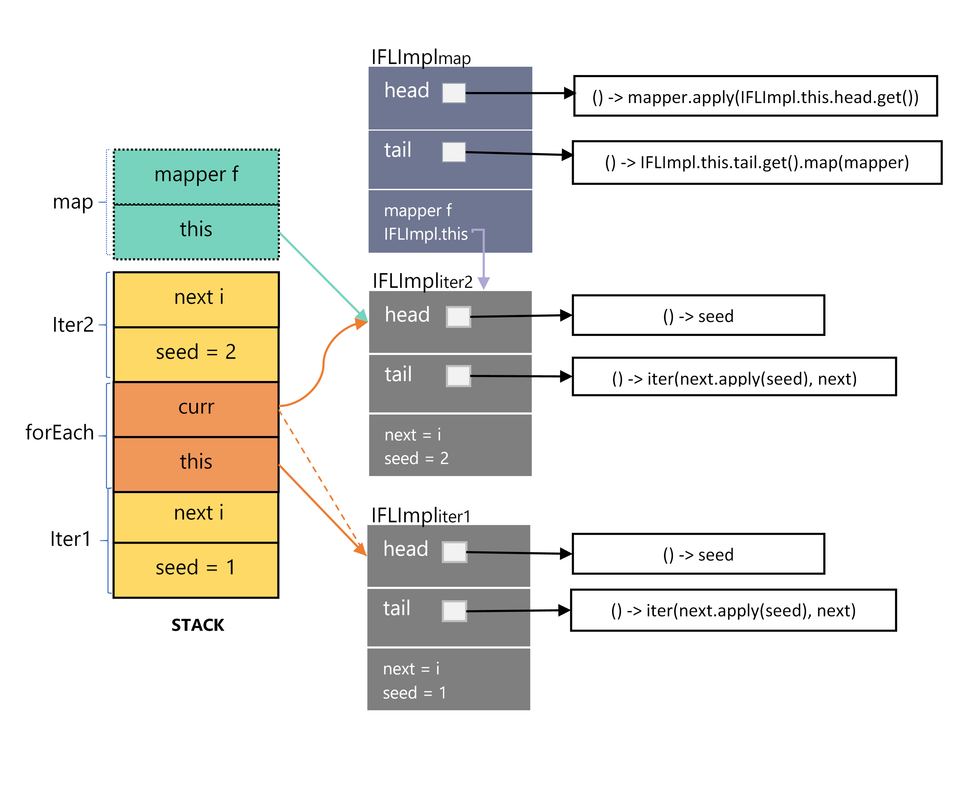Immutable Infinite List And Mutable Infinite List
In Lecture 9, We learnt to appreciate the laziness of Streams by designing our own infinite list.
Mutable Infinite List(Implementation 1)
- An InfiniteList is a generic list that can store elements of type T in order where duplicates are allowed. InfiniteList is defined as an interface, and then each operation on an infinite list is implemented as a class that implements the InfiniteList interface.
- The InfiniteList interface has an abstract get() method, which is used to obtain the next element from the infinite list. The key to implementing an intermediate operation on the infinite list is to override the get() method, and implement the logic of each method in its body.
Let us create a mutable infinite list (InfiniteListImpl abstract class) which implements InfiniteList
InfiniteList< T > class contains the abstract classes of all operations that will later be defined in InfiniteListImpl<T> and also an abstract method get()
InfiniteListImpl < T > is an abstract class(Because it does not implement the get() method) that will implement the immediate operations by override the get() method and implementing the logic in the method body
Immutable Infinite List(Implementation 2)
- An infinite list (when not empty) contains a head value and a tail list.
- To make an infinite list be processed like a Stream, we can store the methods that are applicable to the infinite list in an IFL interface and create a class which implements the interface but behaves like a Stream, in a delayed manner.
Let’s create an immutable class which implements IFL: IFLImpl< T >
IFLImpl< T > contains:
- A Head (Supplier<Optional<T>>)
-> Gives the current value when Supplier’s get() method is called.
( ) -> O
- A Tail (Supplier<IFLImpl<T>>)
-> Gives another IFLImpl when Supplier’s get() method is called.
( ) -> OOOO
Figure 1. An Infinite List with a head and a tail Infinite List which gives another head and tail Infinite List…
Both head and tail are Suppliers so that production of data can be delayed. Suppliers signal the intention that you want to do the action but not yet till you call Supplier’s get() method. Both head and tail should be made ‘private final’ in the spirit of Immutability.
Stream Operations
Different operations will be represented by different IFLImpl with its own customized operations on the head and tail. Additionally, every data source/ intermediate operation will generate a new node (IFLImpl) because here we are trying to make the nodes immutable rather than update the node.
Data Source Operations
Generate
Implementation 1(Mutable)
public static <T> InfiniteListImpl<T> generate(Supplier<? extends T> supplier) {
return new InfiniteListImpl<T>() {
public Optional<T> get() {
return Optional.of(supplier.get());
}
};
}
Implementation 2(Immutable)
public static <T> IFLImpl<T> generate(Supplier<T> supplier) {
Supplier<Optional<T>> newHead = () -> Optional.of(supplier.get());
Supplier<IFLImpl<T>> newTail = () -> IFLImpl.generate(supplier);
return new IFLImpl<T>(newHead, newTail);
}
Iterate
Implementation 1(Mutable)
public static <T> InfiniteListImpl<T> iterate(T seed, UnaryOperator<T> f) {
return new InfiniteListImpl<T>() {
private T element = seed;
private boolean firstEle = true;
public Optional<T> get() {
if (firstEle) {
firstEle = false;
} else {
element = f.apply(element);
}
return Optional.of(element);
}
};
}
Implementation 2(Immutable)
public static <T> IFLImpl<T> iterate(T seed, Function<T, T> next) {
Supplier<Optional<T>> newHead = () -> Optional.of(seed);
Supplier<IFLImpl<T>> newTail = () -> IFLImpl.iterate(next.apply(seed), next);
return new IFLImpl<T>(newHead, newTail);
}
Next seed is obtained via next.apply(seed)
Intermediate Operations
Map
Implementation 1(Mutable)
public <S> InfiniteList<S> map(Function<? super T, ? extends S> mapper) {
return new InfiniteListImpl<S>() {
public Optional<S> get() {
return InfiniteListImpl.this.get().map(mapper);
}
};
}
Implementation 2(Immutable)
public <R> IFLImpl<R> map(Function<T,R> mapper) {
Supplier<Optional<T>> newHead = () -> IFLImpl.this.head.get().map(mapper);
Supplier<IFLImpl<T>> newTail = () -> IFLImpl.this.tail.get().map(mapper);
return new IFLImpl<T>(newHead, newTail);
}
Map returns a new IFLImpl object with the head supplier that
- is triggered by a terminal operation (e.g. forEach) at the end of the stream pipeline
- gets the element upstream from the data source through IFLImpl.this.head.get()
- apply the mapper function to the element obtained to get a mapped element
Filter
Implementation 1(Mutable)
public InfiniteList<T> filter(Predicate<? super T> predicate) {
return new InfiniteListImpl<T>() {
public Optional<T> get() {
Optional<T> element = InfiniteListImpl.this.get();
while (element.isPresent() && !element.filter(predicate).isPresent()) {
element = InfiniteListImpl.this.get();
}
return element;
}
};
}
Implementation 2(Immutable)
public IFLImpl<T> filter(Predicate<T> predicate) {
Supplier<Optional<T>> newHead = () -> IFLImpl.this.head.get().filter(predicate);
Supplier<IFLImpl<T>> newTail = () -> IFLImpl.this.tail.get().filter(predicate);
return new IFLImpl<T>(newHead, newTail);
}
Optional is used to deal with the missing values
-> If a value is present, and the value matches the given predicate, an Optional describing the value is returned.
-> Otherwise, an empty Optional is returned.
Limit (state not maintained in the spirit of Immutability)
Implementation 1(Mutable)
public InfiniteListImpl<T> limit(long maxSize) {
if (maxSize < 0) {
throw new IllegalArgumentException(String.valueOf(maxSize));
}
return new InfiniteListImpl<T>() {
private long max = maxSize;
public Optional<T> get() {
if (max < 1) {
return Optional.empty();
} else {
max--;
return InfiniteListImpl.this.get();
}
}
};
}
Implementation 2
We can create an EmptyList class with an isEmpty() method that checks whether an infinite list is empty so that the terminal operations know when to stop the stream pipeline operation.
public IFLImpl<T> limit(long n) {
if (n <= 0 || isEmpty()) {
return new EmptyList<>();
}
return new IFLImpl<T>(head, () -> {
if (n == 1) return head.get().isPresent()
? new EmptyList<>()
: tail.get().limit(n);
else return head.get().isPresent()
? tail.get().limit(n - 1)
: tail.get().limit(n);
});
}
Terminal Operations
ForEach
Implementation 1(Mutable)
public void forEach(Consumer<? super T> action) {
Optional<T> curr = get();
while (curr.isPresent()) {
action.accept(curr.get());
curr = get();
}
}
Implementation 2(Immutable)
public void forEach(Consumer<T> action) {
IFLImpl<T> curr = this;
while(true) {
current.head.get().ifPresent(x -> action.accept(x));
curr = current.tail.get();
}
}
current.head.get()invokes the head supplier to get an elementcurr.tail.get()will call iter which will return a new IFL- forEach needs a reference to maintain what it is currently looking at, so we give it a current pointer (curr) that is originally pointing to itself and will refer to a new IFLImpl object everytime it is called
- forEach will call the newest node that has been generated
Reduce
Implementation 1(Mutable)
public T reduce(T identity, BinaryOperator<T> accumulator) {
Optional<T> tmp1 = Optional.of(identity);
Optional<T> tmp2 = InfiniteListImpl.this.get();
while (tmp2.isPresent()) {
tmp1 = Optional.of(accumulator.apply(tmp1.get(), tmp2.get()));
tmp2 = InfiniteListImpl.this.get();
}
return tmp1.get();
}
Implementation 2(Immutable)
public <U> U reduce(U identity, BiFunction<U, ? super T, U> accumulator) {
U temp = identity;
InfiniteListImpl<T> tmp = this;
while (!(tmp instanceof EmptyList)) {
if (tmp.head.get().isPresent()) {
temp = accumulator.apply(temp, tmp.head.get().get();
}
tmp = tmp.tail.get();
}
return temp;
}
tmp.head.get()checks which head is not empty and invokes the head supplier to get an elementtmp.tail.get()will return a new InfiniteListImpl- Reduce has a pointer(tmp) to keep track of what is currently being looked at, it refers to a new InfiniteListImpl during every iteration
IMPORTANT CONCEPT
Variable Capture (Using Java Memory Model)
Figure 2. Model when IFL.iter(1, x -> x+1).forEach(action) is called and when we bring map into the picture
- Nodes don’t mutate throughout, a new IFL object is created
- Variables are captured within each IFL object created
Process:
IFL.iter(1, x -> x + 1)creates a new IFLImpliter1 object with its specified head and tail. The seed(1) and next(i) is captured by the new object.- forEach(action) is called on the object created. ‘this’ points to the object and curr also point to the object and the forEach method will operate on the object and call iter (refer to forEach section for more details). The cycle repeats until there is no element to retrieve.
- If map is called, map will create a new IFLImplmap object with its specified head and tail. The previous object will be captured to get the element from the object to apply mapper to it. </T>

